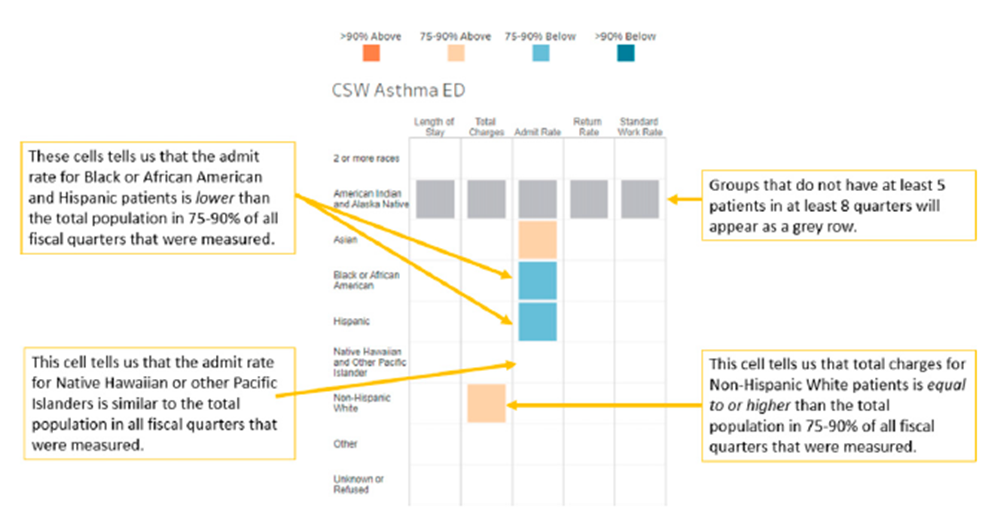Seattle Children's Equity Dashboards
Data Visualization for Assessing Inequities in a Hospital Setting
The Clinical Effectiveness department of the Center for Quality and Patient Safety and the Center for Diversity and Health Equity of Seattle Children's Hospital (“Seattle Children’s”) have partnered to create data dashboards that identify disparities in outcomes for selected patient populations (the “Equity Dashboards”). In the spirit of collaboration toward eliminating racial health inequities, Seattle Children’s offers these Equity Dashboards as a resource for others.
These Equity Dashboards are meant to identify, challenge and change systems of racial inequity, and promote more equitable health outcomes. The visualizations may help identify inequities and prioritize quality improvement projects at your organization. Data views are configured to trend Key Performance Indicators (“KPIs”) over time, display disparities, and automatically update quarterly. Analyses can be organized by selected demographics.
Seattle Children’s teams have used these visualizations to identify and eliminate found inequities; we hope they can help you do the same.

Learn more about this work in the March 2023 Pediatrics journal article: Pediatrics (2023) 151(3): 32022058848.
The code is available free of charge for non-commercial use in R, Tableau, and Power BI platforms. In exchange for providing the code, we ask that you share how it works, lessons learned, and ideas for improvements. To access the code, please complete this form.
Summary: The Equity Dashboard packages allow you to create configurable data visualization dashboards to better understand patterns of Key Performance Indicators (KPIs) in a healthcare institution with the objective of discovering potential disparities or inequities of care that may be addressed. The Equity Dashboards were built to analyze selectable KPIs across either clinical units and/or clinical standard work (“CSW”) pathways and display results stratified against time and patient Race, Ethnicity and Language of care (REaL) parameters. The Equity Dashboards are intended to help identify disparities that may be investigated during regular Plan-Do-Study-Act (“PDSA”) improvement cycles.
Results May Vary: Seattle Children’s cannot guarantee your results. Neither Seattle Children’s nor the authors warrant that the Equity Dashboard is in every respect accurate or complete, and the authors and Seattle Children’s are not responsible for any errors or omissions or for the results obtained from use the Equity Dashboard. These Equity Dashboards as implemented at Seattle Children’s rely on our established clinical standard work pathways and our implementation of EPIC and Tableau, PowerBI, or R for data visualization. Your implementation will require modifications based on your systems. The Equity Dashboards do not constitute professional medical advice, diagnosis, treatment, or recommendations of any kind. You are encouraged to work with your Quality Improvement, Patient Safety, Clinical Effectiveness, and Clinical Data Analytics teams when implementing the Equity Dashboards in your setting.
Pattern Display: The Equity Dashboards do not operate on the basis of inferential statistics, but rather on the principle of highlighting and displaying patterns of disparities in care KPIs between patient populations.
Designed for Data Visualization: The Equity Dashboards are designed for use with: R, Tableau, and PowerBI. To use the Equity Dashboards code to visualize your data in Tableau or PowerBI, you will need a license to those products.
Questions: If you have questions, please email us at equitydashboards@seattlechildrens.org.